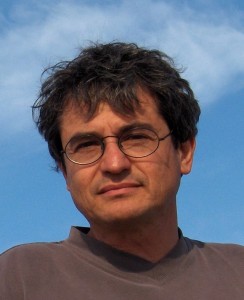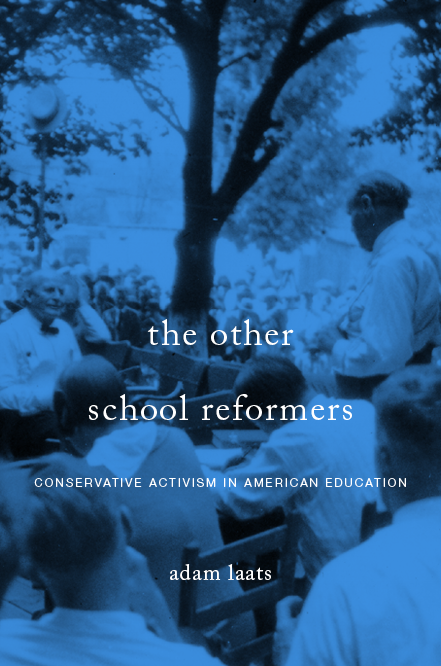HT: DL
I don’t know what to think. For almost a hundred years, creationists and other conservatives have complained that mainstream science—often symbolized by the idea of evolution—threatened their children’s faith. For just as long, leading scientists have insisted that there was nothing religious about real science. But a recent chat with physicist Carlo Rovelli makes me wonder.
First, some premises:
1.) Public schools should not be teaching religious ideas to children. Schools may and should teach ABOUT religions, but public schools should not attempt to push students toward or away from any faith.
2.) Public schools must offer students the best available scholarship. In science class, this means students must learn the modern evolutionary synthesis.
3.) Secondary-school education–in the USA, that means high schools and middle schools–should train students to think in ways familiar to the scholarly disciplines. So, in history class, we follow Stanford’s Sam Wineburg in hoping to teach students to engage in the “unnatural act” of thinking like a historian. The same should be true in other disciplines. Students should be learning basic principles of mathematical thinking, literary thinking, and scientific thinking.
So here’s our dilemma. For a while now, conservative creationists have complained that public schools are teaching evolution as a religion. Nonsense, mainstream scientists have responded.
Because, of course, if evolution were a religion, it should not be taught in public schools. It could be taught ABOUT, but not taught as something towards which students ought to be pushed.
But as trenchant observers have observed, there are indeed some religious aspects of mainstream scientific belief. Or, to put it more precisely, there are important ways in which the attitudes of mainstream scientists clash with certain conservative theological beliefs. As my favorite atheist observer of American creationism Jason Rosenhouse argued, traditional Christians are correct in thinking that evolutionary ideas pose a drastic theological threat.
And today we come across more fuel for this dilemma. In a recent interview in Scientific American, physicist Carlo Rovelli seconds the notion that mainstream science is–as much as it is anything–a skeptical attitude toward absolute truth. As Dr. Rovelli put it,
I have no idea what “absolute truth” means. I think that science is the attitude of those who find funny the people saying they know something is absolute truth. Science is the awareness that our knowledge is constantly uncertain.
I don’t need to be up on the latest in quantum physics to see how such an attitude could be problematic for the conservative parents of American school children. If such children were being taught the basic principles of mainstream science, and if those principles coincided with Rovelli’s attitude, then conservative parents might indeed have cause for complaint.
A family wouldn’t need to be any sort of creationist to take issue, either. Anyone who takes their Judaism or Christianity seriously might be chagrined to find their children coming home from school and telling them, “I find it funny when people say they know something is absolute truth.”






David Long
/ August 31, 2014This helps.
myonlyissue
/ August 31, 2014So are you saying that “modern evolutionary synthesis” is an absolute truth and then quoting a man who believes there is no absolute truth? Darwin was a racist, a member of the British elite and married his cousin like the royals and central bankers in order to keep his bloodline ‘pure’. Darwin’s theory of linear evolution has been disproved specifically in the case of the finches which tend to evolve cyclically depending on which food source is available. Go ahead, teach it as a theory but it is far from absolute truth. You believe it, it is your faith, you want students to be trained like rats to agree with you, you proselytize Darwin, not teach a theory.
The public schools is the USA have fully adopted standards and curriculum that can be traced to the UK and is underpinned by the “whole child” model. Promoted by the Christian Scientist Monitor (closely associated with the central banker owned Economist magazine) ASCD and many other sources, this model is formed out of Gardner’s Multiple Intelligences a hotly debated, fully disputed by multiple education experts, and has been most successfully implemented is Waldorf schools. These schools invented by a very, extremely religious man (Anthroposophy), Rudolph Steiner, and combined with Skinnarian (BF Skinner a man who insisted that education was a means to change the child’s attitudes and beliefs) rat training, makes the school system extremely religious, a spiritual shifting training center where I expect to see esoteric ancient mystery teachings continue.
Keep bitching about Darwin, Christians rightly complain about the progressive religion of theosophy and witchcraft, if you hate religion in school, as you so pretend too, you would seek to ban it as well, but I suspect you like it.
myonlyissue
/ August 31, 2014Darwin lived in India. I can see why the elite love the caste system. It makes them the permanent ‘fittest’ class. Funny how Darwinism is so similar to Hinduism.
Neil Rickert
/ August 31, 2014This isn’t new. For as long as I can recall, there have been scientists saying that science isn’t about truth; that science is a pragmatic enterprise.
Theologians like to talk about absolute truth. But, if you look at the disputes between different religions and different branches of Christianity, you will find a lot of disagreement over what is that presumed absolute truth.
The modern creationist accepts the pragmatic virtues of science when he/she uses an automobile or an airplane or a computer.
Agellius
/ August 31, 2014“Science is the awareness thar our knowledge is constantly uncertain.”
But somehow our knowledge of this fact is certain? : ) They’re basically picking and choosing what’s certain and uncertain based on their philosophical preferences.
keithnoback
/ September 1, 2014Awesome! The first two comments, besides launching with the greatest examples of the genetic fallacy which I have ever seen (thanks for that), demonstrate the nature of the problem very well: fundamentalism is a political stance, not a philosophical or theological one. I am speaking out of turn here, seeing whose forum this is, but that’s how it looks.
I grew up in the Last Liberal Southern Baptist Church. For years, it puzzled me why that church eventually got purged. I had left all religion long since when it happened, so I wasn’t upset, but I couldn’t understand what the fundamentalists had against the liberal Baptists. Then I really listened to what the fundamentalists had to say about it. Their arguments all boiled down to claims about the social consequences of deviation. Sure, they talked about hell and personal salvation, but they justified their approach by saying certain behaviors doom people to hell, and hell-bound people will behave in a certain way – physically and psychologically. I see the same arguments again regarding evolution and education in general. Don’t accuse the fundamentalists of not being pragmatists; they are pragmatic, just at a different level. It’s the same level on which their fellow travelers in history have operated – men like Li Ssu Ma and Han Fei Tzu.
I don’t know what Agellius’ full position on creationism is, but his comment illustrates my point. The statement about ‘certain uncertainty’ stands if it refers to ontology – what exists. Then it is self-contradictory. If it refers to methodology – epistemology, how we come to know things – then there is no contradiction. It merely states that our experiential knowledge is limited by nature and our broader statements based on it must be provisional. Fundamentalism disallows the latter position. All statements about knowledge are ontological because those statements are about a political position primarily. Allegiance to a flag motivates all statements. “They are basically picking and choosing what’s certain and uncertain based on their philosophical preferences.” where ‘philosophical preferences’ are seen as the colors of one’s flag.
Agellius
/ September 1, 2014Keith:
Rovelli wrote (before the statement I quoted previously), “science is the attitude of those who find funny the people saying they know something is absolute truth.”
It’s apparent to me that he is saying we can’t know absolute truth. But is he saying this provisionally, or absolutely? It sounds like an absolute statement to me. So in making the statement, he admits that some things can be known absolutely. I wonder if he finds his own statement funny?
Tim
/ September 1, 2014David Long’s link is helpful. I disagree with Keith that fundamentalism is primarily a political stance. He is helpful in distinguishing ontology from epistemology, but is wrong to think that everything is ontological to a fundamentalist.
Parsing Dr. Rovelli’s quote: “I have no idea what “absolute truth” means. I think that science is the attitude of those who find funny the people saying they know something is absolute truth. Science is the awareness that our knowledge is constantly uncertain.” It seems that he is conflating two different things – the existence of an abstract concept “the truth” on one hand and human ability to ascertain whether any given statement is “true” on the other hand. Someone may acknowledge (as fundamentalists do) that our “our knowledge is constantly uncertain” while still believing that some statements are relatively more accurate descriptions of reality while others are less accurate, even if it is hard to be certain which is which. Alternatively someone may deny that there is such a thing as any underlying reality with which statements may be compared (which is what fundamentalists reject.)
I doubt Dr. Rovelli is open to the idea that the earth is only 6000 years old. He may be uncertain about many things, but he’s probably almost absolutely certain that the earth is closer to 5.5 BY than to 6000. His mind could be changed on that score by evidence, but it would take a great deal of evidence of a particular type to overcome his near certainty. In this regard, he and fundamentalists are in philosophical agreement. They also believe that our knowledge of many things is uncertain but that something like the age of the earth can be determined with a high degree of certainty. They also feel that they have almost absolutely certain knowledge of how old the earth is, but their minds on that topic could be changed by evidence as well; it is just that the set of evidence that would be convincing to them is different than the set that would be convincing to Dr. Rovelli.
In short, I think fundamentalists do have objections to a religious point of view being pushed as “the truth” in public education when it contradicts their religious beliefs whether is masquerades as science or not. But skepticism about human limitations in arriving at certain knowledge is not at the heart of the debate, even though language about “absolute truth” from all sides might leave that impression.